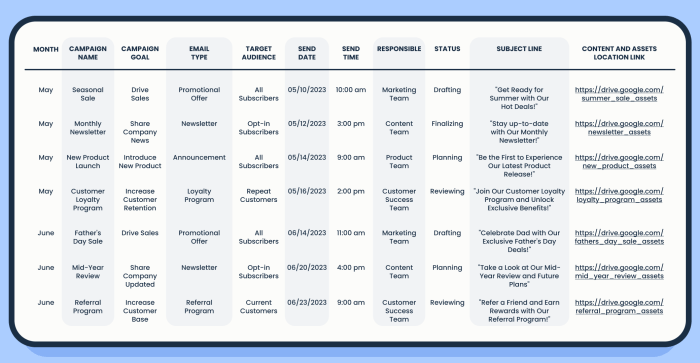Developing an Event Marketing Calendar sets the stage for this enthralling narrative, offering readers a glimpse into a story that is rich in detail with American high school hip style and brimming with originality from the outset.
Get ready to dive into the world of event marketing calendars, where strategic planning meets creative promotion to drive success in your events.
Importance of Developing an Event Marketing Calendar

Having a well-planned event marketing calendar is crucial for successful event promotion as it provides a roadmap for all marketing activities leading up to the event.
Organizing Tasks and Setting Timelines, Developing an Event Marketing Calendar
A structured calendar helps in organizing tasks by breaking down the marketing plan into actionable steps. It allows the team to set timelines for each task, ensuring that everything is completed on time and nothing falls through the cracks.
Ensuring Consistency in Marketing Efforts
Consistency is key in marketing, and a comprehensive calendar helps in maintaining a consistent message across all channels. By planning ahead and scheduling content in advance, the marketing team can ensure that the event is promoted effectively and continuously.
Impact on Event Success and Attendee Engagement
A well-developed event marketing calendar directly impacts the overall success of the event. It helps in creating buzz, generating excitement, and reaching the target audience effectively. Consistent marketing efforts result in increased attendee engagement, leading to a higher turnout and overall satisfaction with the event.
Components of an Effective Event Marketing Calendar
When creating an event marketing calendar, it is crucial to include key elements that will help you stay organized and on track. This involves incorporating important dates, deadlines, promotional activities, and content creation schedules. Allocating resources, budgeting, and tracking metrics within the calendar is also essential for success.
Key Elements of an Event Marketing Calendar
An effective event marketing calendar should include the following key elements:
- Event Dates: Clearly mark the dates of the event, including any pre-event activities or post-event follow-ups.
- Deadlines: Include deadlines for tasks such as booking venues, finalizing speakers, and sending out invitations.
- Promotional Activities: Plan out your promotional activities, such as social media campaigns, email marketing, and advertisements.
- Content Creation Schedule: Create a schedule for developing content such as blog posts, videos, and graphics to promote the event.
Importance of Resource Allocation
Allocating resources effectively is crucial for the success of your event marketing calendar. This involves assigning tasks to team members, ensuring they have the necessary tools and support to complete their tasks, and managing the budget to avoid overspending.
Tracking Metrics and Budgeting
Tracking metrics within your event marketing calendar allows you to measure the success of your promotional activities and make adjustments as needed. Budgeting is also essential to ensure that you are allocating funds appropriately and staying within your financial constraints.
Strategies for Developing a Detailed Event Marketing Calendar
Creating a detailed event marketing calendar requires careful planning and strategic thinking to ensure the success of your events. Here are some best practices and tips to help you develop a comprehensive calendar that aligns with your objectives, target audience, and marketing channels.
Aligning with Event Objectives, Target Audience, and Marketing Channels
- Start by clearly defining your event objectives and goals. Understand what you want to achieve with each event and how it aligns with your overall marketing strategy.
- Identify your target audience and their preferences. Tailor your marketing calendar to reach and engage this specific audience effectively.
- Determine the most appropriate marketing channels to promote your events. Whether it’s social media, email marketing, or traditional advertising, choose the channels that will maximize your reach and engagement.
Importance of Flexibility and Adaptability
- Be prepared to adjust your event marketing calendar as needed. Stay flexible to accommodate changes in your objectives, target audience, or external circumstances.
- Monitor the performance of your marketing efforts and be ready to pivot if certain strategies are not delivering the desired results. Adaptability is key to success in event marketing.
- Include buffer time in your calendar to allow for unforeseen circumstances or last-minute changes. This will help you stay on track and meet your event goals effectively.
Tools and Software for Managing Event Marketing Calendars

When it comes to managing event marketing calendars, having the right tools and software can make a huge difference in staying organized and on track. Let’s explore some popular options available for creating and managing event marketing calendars.
Popular Tools and Software Options
There are several tools and software options specifically designed to help marketers manage their event calendars efficiently. Let’s take a look at some of the most popular ones:
- Google Calendar: A widely used calendar tool that allows for easy scheduling, sharing, and integration with other Google apps.
- Trello: A project management tool that uses boards and cards to organize tasks and deadlines, perfect for managing event marketing activities.
- Asana: Another project management tool that offers calendar views, task assignments, and collaboration features to keep everyone on the same page.
- HubSpot: A comprehensive marketing platform that includes a calendar tool for planning and tracking marketing campaigns, including events.
Comparing Features and Usability
Each of these tools has its own set of features and usability that cater to different needs. While Google Calendar is more basic and user-friendly, Trello and Asana offer more robust project management capabilities. HubSpot, on the other hand, provides a holistic view of your marketing activities, including events.
Benefits of Using Technology
Utilizing technology to manage event marketing calendars offers several benefits, such as:
- Streamlining calendar management processes
- Enhancing collaboration among team members
- Tracking marketing activities and performance more effectively







